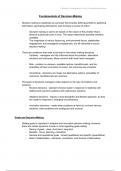Principles of Management IIA by ProfessorBurgerQueen
Fundamentals of Decision-Making
- Decision-making is explained as a process that includes defining problems, gathering
information, generating alternatives, and choosing a course of action
- Decision-making is said to be based on the nature of the problem that is
faced at a particular point in time. The nature determines possible solutions
available
- The magnitude of various factors eg. environmental forces, stakeholder
engagement, and managerial competencies, are all influential to sound
decision-making
- There are conditions that need to be kept in mind when making decisions
- Certainty - managers are fully informed about the problem, alternative
solutions and outcomes. More common with lower level managers
- Risk - problem is unknown, available options, benefits/costs, and the
probability of their occurrence is known, but outcomes are uncertain
- Uncertainty - decisions are made, but alternative options, probability of
outcomes, benefits/costs are unknown
- The types of decisions managers make depend on the type of problems and
solutions
- Routine decisions - standard choices made in response to relatively well
defined and common problems with well-known solutions
- Adaptive decisions - require a more thoughtful and flexible approach, as they
are made in response to changing circumstances
- Innovative decisions - made when problems at hand do not have obvious
solutions; when problems are ambiguous and unusual
Goals and Decision-Making
- Setting goals is important in adaptive and innovative decision-making. However,
there are certain dynamics to bear in mind regarding goals setting
- Nature of goals - clear, short-term, long-term
- Benefits - focus, planning, motivation
- General and operational goals - broad (qualitative) and specific (quantitative)
- Role of stakeholders - demands, constraints, and choices of alternatives




